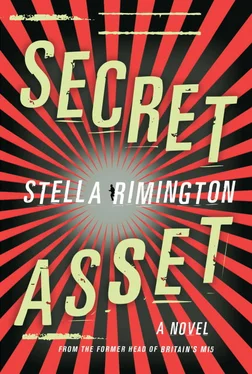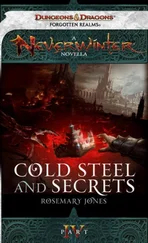“Forgive me,” said Fane, putting down the phone and standing up to shake hands. “Our man in Bogota is a little verbose.”
He wore a blue pinstripe suit, which accentuated his height, and an Honourable Artillery Company tie. With his high cheekbones and aquiline nose, he cut a dashing figure, though, as Liz already knew, he was hard to warm to. His manner of talking was articulate and often amusing, and like Wetherby he spoke with an air of appreciative irony, but unlike Wetherby, his irony could suddenly turn to biting wit. For Geoffrey Fane, professional matters were personal. He needed to win and Liz knew that he could suddenly, capriciously turn on people. In their few encounters, Liz had never found him entirely trustworthy.
They sat down again, and Fane looked out the window. “Rain’s coming, I’m afraid.”
In the distance Liz could see the office blocks in Victoria Street and a tight blanket of scudding cloud fast approaching. The windows at Vauxhall Cross were triple-glazed against mortar attack, and this cast a grey-green filtered tint on the world outside, making it sombre on even the sunniest day. She went straight to the point. “I wanted to see you about this Irish business.”
“Ah yes, the peculiar legacy of Sean Keaney. Tell me, how is Peggy Kinsolving working out?”
This is not what Liz wanted to talk about. “She’s very good,” she said swiftly. “She’s helped make an important discovery.”
Fane raised an eyebrow. “Discovery?”
“Yes. We’ve come to the conclusion that there actually is a mole.”
“Really? In place. Planted by the IRA?” Fane sounded incredulous.
“Originally,” said Liz. “But we think he’s moved on.”
Fane shot both cuffs rather carefully, and Liz suppressed a smile. For all his patrician air, he had a dandy’s showman instincts. Wetherby had precisely the same habit, but with him you felt it was done out of a desire for sartorial order; with Fane, she decided, it was designed to show off his cufflinks.
“Left the Service, you mean? Do you know who he was?”
“No. I don’t mean left the Service. He’s still here. We think it’s Tom Dartmouth.”
“Tom Dartmouth?” Fane could not disguise his surprise. “Does Charles share this view?” he said with sharp scepticism.
“He does,” she said coolly. She was not going to be bullied by Fane.
“Are you sure about this?”
“The evidence so far is entirely circumstantial.”
Fane sat up straight. He looked ready to challenge her, so she continued quickly. “It’s likely to remain that way for the moment, too, because Tom has vanished.”
“Vanished?” said Fane, his aggression suddenly deflated.
“Obviously we wanted to let you know right away,” said Liz. “Particularly because of Tom’s secondment to Six. But I’m also here to find out more about his time in Pakistan. We’re concerned that he may have moved on from the IRA and that he is helping a small Islamic terrorist group we’re trying to find. It’s the group you know about from the CTC. The bookshop group. Operation FOXHUNT. We think it’s possible he first made contact with them in Pakistan.”
“Yes, of course I know about FOXHUNT, but what has that to do with the IRA?” said Fane. “I must say, Elizabeth, this seems completely confusing.” By the time Liz had explained her thesis, Fane’s expression had turned from scepticism to gravity. “Well, as it happens, our station chief in Islamabad is with us this week. He’s been over at the Foreign Office but he may well be back by now.”
A few telephone calls later, and Miles Pennington, MI6’s head of station in Pakistan, walked into Fane’s office. Pushing fifty, Miles Pennington had receding hair and a bluff manner. According to Fane he was an “old Asia hand”—six years in Pakistan, a stint in Afghanistan, another in Bangladesh—and with his deep tan and lightweight khaki suit he certainly looked the part. Extending a firm, dry hand for Liz to shake, he sat down and listened while Fane explained they needed his help. Liz broke in to ask for his signature on the indoctrination list for the mole hunt. “I already have your signature, Geoffrey,” she said. The indoctrination list, activated for the most secret operations, not only meant that the operation could only be discussed with others on the list, but also produced a complete index of those in the know, in case there should be a leak. As he looked at the sheet which Liz handed him and saw how very few names there were on it—Liz, Peggy, Charles Wetherby and Geoffrey Fane, C of MI6 and DG of MI5, as well as the Home Secretary and a few other names he didn’t recognise, Pennington blanched. That sort of list indicated a very serious operation indeed.
“We want to talk about Tom Dartmouth,” said Fane, all languor gone. “Elizabeth will explain what we’re looking for.”
Liz and Fane had agreed that Miles Pennington did not need to know about the IRA angle and so she focused only on the immediate problem. “We are urgently trying to locate three suspected terrorists here in the UK. They are all British, but of Asian origin—there’s one we have identified and he’s from a Pakistani family in the Midlands. The other two are unknown to us.”
She paused, aware that Pennington must be wondering what this had to do with Tom Dartmouth, whom he knew only as a junior colleague, seconded from MI5. Taking a deep breath Liz said, “We have reason to believe that Tom Dartmouth has been in contact with the terrorists, and in fact may be actively helping them.” She ignored Pennington’s stunned expression. “Unfortunately, he’s gone to ground. So we’re trying to understand what’s behind all this.”
Pennington managed a hesitant nod, but was clearly still trying to take it in. Liz said, “Could you give me your view of Tom? One of the problems we’re having is that he’s only been back here in London for four months and before that he’d been with you for four years. What did you make of him?”
Pennington took some time to respond. At last, choosing his words with care, he said, “Intelligent, fluent Arabic speaker, worked very hard—without getting too intense about it.”
“Intense”—how typical, thought Liz. The cult of the English amateur—legacy of a Victorian public-school ethos—still alive and kicking in the offshore stations of MI6. Work hard but pretend you’re not, make the difficult seem easy—all from an era when gentlemen ran the vestiges of an empire.
“What about life outside work?” she asked. “Did you see much of him then?”
“Yes. We are all pretty close, given the circumstances in Pakistan. Though of course he was in Lahore and I’m mainly in Islamabad. He seemed to fit in pretty well. That doesn’t always happen when we get someone from Five.” Pennington suddenly looked embarrassed, remembering where Liz worked. “He liked a drink, but not to excess. There was the odd girl around, but again nothing improper—he’s divorced isn’t he?”
“Was there anything strange about him, anything remarkable?”
“Not really,” said Pennington, who spoke with a hint of a drawl. “He wasn’t the most outgoing of colleagues.” Liz could see he was struggling to remember the attributes of a man he had never envisaged occupying centre stage. “He wasn’t mysterious or anything like that. Even with the benefit of hindsight,” he added, glancing at the indoctrination form, “I’d still say that.”
He gave a low sigh, half regretful, half resigned. “I suppose the right word to describe him would be ‘detached.’ Not so much as to make one notice; as I say, he fitted in well enough. But thinking about it, I’d say he was always keeping something in reserve.”
“Can you tell me about his work?”
Читать дальше












